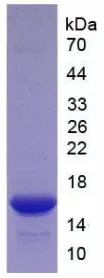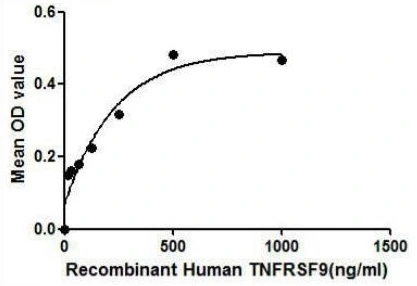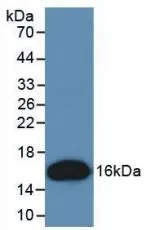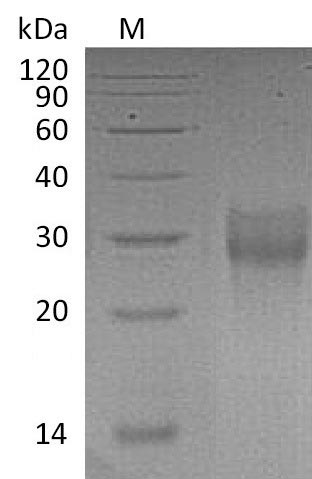
SDS-PAGE analysis of GTX00128-pro Human CD137 protein.
Human CD137 protein, His tag
GTX00128-PRO
ApplicationsFunctional Assay
Product group Proteins / Signaling Molecules
Protein IDQ07011
Overview
- SupplierGeneTex
- Product NameHuman CD137 protein, His tag
- Delivery Days Customer9
- Application Supplier NoteTNFRSF9 (Tumor necrosis factor receptor superfamily member 9) is a member of the TNF-receptor superfamily. This receptor contributes to the clonal expansion, survival, and development of T cells. A binding ELISA assay was conducted to detect the interaction of TNFRSF9 and TNFa. Briefly, recombinant human TNFRSF9 were diluted serially in PBS, with 0.01% BSA (pH 7.4). Duplicate samples of 100 microl were then transferred to TNFa-coated microtiter wells and incubated for 2h at 37C. Wells were washed with PBST and incubated for 1h with anti-TNFRSF9 pAb, then aspirated and washed 3 times. After incubation with HRP labelled secondary antibody, wells were aspirated and washed 3 times. With the addition of substrate solution, wells were incubated 15-25 minutes at 37C. Finally, add 50 microl stop solution to the wells and read at 450nm immediately. The binding activity of TNFRSF9 and TNFa was in a dose dependent manner.
- ApplicationsFunctional Assay
- CertificationResearch Use Only
- ConjugateUnconjugated
- Gene ID3604
- Target nameTNFRSF9
- Target descriptionTNF receptor superfamily member 9
- Target synonyms4-1BB, CD137, CDw137, ILA, IMD109, tumor necrosis factor receptor superfamily member 9, 4-1BB ligand receptor, CD137 antigen, T cell antigen ILA, T-cell antigen 4-1BB homolog, homolog of mouse 4-1BB, induced by lymphocyte activation (ILA), interleukin-activated receptor, homolog of mouse Ly63, receptor protein 4-1BB
- Protein IDQ07011
- Protein NameTumor necrosis factor receptor superfamily member 9
- Scientific DescriptionThe protein encoded by this gene is a member of the TNF-receptor superfamily. This receptor contributes to the clonal expansion, survival, and development of T cells. It can also induce proliferation in peripheral monocytes, enhance T cell apoptosis induced by TCR/CD3 triggered activation, and regulate CD28 co-stimulation to promote Th1 cell responses. The expression of this receptor is induced by lymphocyte activation. TRAF adaptor proteins have been shown to bind to this receptor and transduce the signals leading to activation of NF-kappaB. [provided by RefSeq, Jul 2008]
- Storage Instruction-20°C or -80°C,2°C to 8°C
- UNSPSC41116100
- SpeciesHuman




